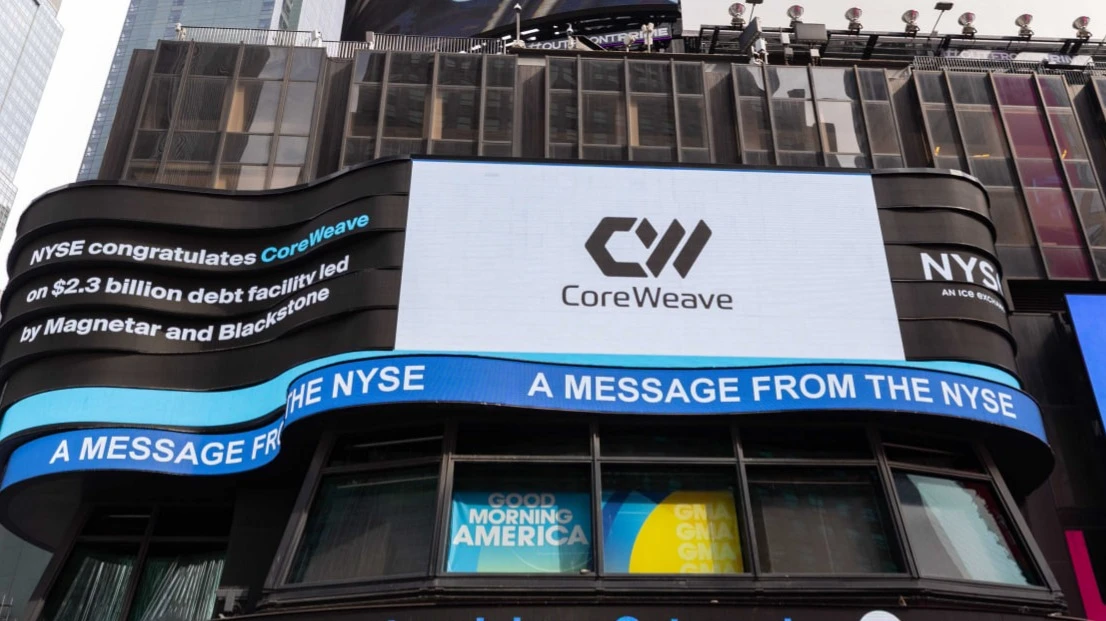CoreWeave stock has collapsed 35% in two weeks. Why does one analyst advise buying?

Cantor Fitzgerald recommended investors to buy shares of cloud computing provider CoreWeave, estimating their growth potential at almost 20%. Despite the drop in CoreWeave's quotes by a third after the disclosure of the quarterly loss, the analyst believes that the expansion of the customer base and strengthening of infrastructure may become drivers of further growth of the company. However, Wall Street also points to the risks to CoreWeave's business due to its high dependence on large customers and limited funding and energy capacity, which makes the company's prospects less certain.
Details
Cantor Fitzgerald analyst Thomas Blakey started coverage of CoreWeave with a "buy" recommendation on the stock, MarketWatch reports. Blakey set the target price of the securities at $116 - this target implies growth of quotations by almost 20%.
The analyst calls CoreWeave a "best-in-class" player in the GPU-as-a-service (renting GPUs for computing in the cloud) market, which is projected to reach $399 billion by 2028. Cantor Fitzgerald notes that CoreWeave is a leading AI infrastructure provider and strategic partner of Microsoft and Nvidia and is ahead of the competition in terms of service quality.
The company's shares added 2.6% on the premarket.
What does Cantor Fitzgerald see as a growth driver?
Nearly 80% of CoreWeave's revenue comes from just two key customers, the largest of which is probably Microsoft, the analyst writes. But order growth from those customers, he notes, remains strong, which supports CoreWeave's outlook and mitigates risk. Nvidia, which is a strategic partner of the company, invested in CoreWeave's IPO in March. That strengthened CoreWeave's competitive position and gave it access to the latest graphics processors, MarketWatch writes.
As CoreWeave's revenue mix and order book shifts from AI training to model application (inference), Blakey sees "broader market potential" for the company, which could be a long-term driver. For investors expecting a more diversified customer base, the analyst recalls the May acquisition of developer platform Weights & Biases, which added nearly 1,500 potential customers to resell CoreWeave's computing services.
CoreWeave is also strengthening its position in addressing power capacity constraints with its recent agreement to acquire Core Scientific. The deal will provide access to 1.3 GW of power through a network of data centers across the US. According to Blakey, the move will improve profitability and be a "near-term catalyst" for the stock.
In addition to securing power, the Core Scientific acquisition allays some of investors' concerns about high financing costs. The deal will allow CoreWeave to own data centers rather than lease them, saving about $10 billion on future lease obligations. The company is also moving toward its goal of achieving investment-grade status for debt securities in the coming years, the Journal writes.
What are other analysts saying?
Ma few dispute CoreWeave's leadership, but still some analysts have expressed doubts about the company's stock because of the risks associated with high customer concentration, financing and securing power capacity. For example, Needham analyst Mike Tsikos recently warned investors that CoreWeave could have a "non-linear relationship between capacity growth and incoming revenue," and D.A. Davidson analyst Gil Luria noted CoreWeave's heavy reliance on debt financing to support expansion, MarketWatch writes.
Of the 26 analysts covering CoreWeave stock, the majority - 15 - are neutral and advise holding (Hold rating). Eight advise buying the company's stock (Buy), three advise selling (Underweight and Sell).
What's going on in the company?
CoreWeave shares have lost about 35% since Aug. 12, when the company reported a larger-than-expected loss. Its adjusted net loss jumped 26-fold to $130.8 million in the April-June quarter and was 36% higher than the market forecast. Operating expenses soared to $1.2 billion from $317.7 million because of aggressive capital spending. This is due to the company having to invest billions of dollars in data centers and infrastructure to keep up with demand.
Additional pressure on investor sentiment came from general concerns that the growing interest in AI companies is overheated.
This article was AI-translated and verified by a human editor
